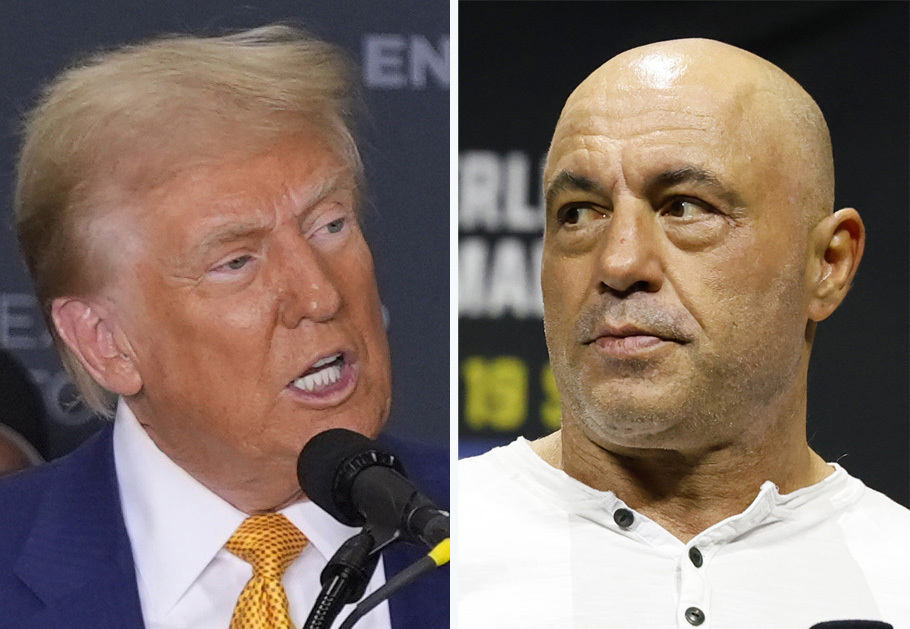Editorial | What it actually means to campaign on podcasts


This combination photo shows Republican presidential nominee former President Donald Trump speaking during a news conference, Oct. 25, 2024, in Austin, Texas, left, and Joe Rogan at a UFC event, Aug. 18, 2023, in Boston. (AP Photo)
Presidential hopefuls Kamala Harris and Donald Trump have caused a decent stir over the last couple of weeks. We are a mere seven days before the election, and both campaigns have picked up the pace.
Kamala Harris is currently traveling the country with vice presidential nominee Tim Walz, with the pair taking interviews and hosting town halls in their wake. While Donald Trump has refused numerous interviews with a variety of news programs, the Republican president and vice president nominees continue to host rallies across the nation, inviting Tesla billionaire Elon Musk and other celebrities up on the stage to endorse him. Their media campaigns are full steam ahead, most notably taking a different approach than presidential races of the past — they’re partaking in interviews on beloved podcasts. In particular, podcasts whose audiences skew younger.
Only three weeks ago, in the span of just a few days, Harris appeared on “60 Minutes” — a longstanding presidential race tradition —, “The View” and “Call Her Daddy.” “Call Her Daddy” is one of the top podcasts in the country, ranked number two on Spotify. Host Alex Cooper mostly talks about sex and relationships but has gotten a slew of celebrities and influencers to join her in conversations on more serious topics. Her audience is primarily young women. In a prequel to the “Call Her Daddy” episode, Cooper shares that she invited both Donald Trump and Kamala Harris to be on the show, implying that Trump’s team denied the request. She received backlash from her more conservative viewers, disgruntled by her platforming of Harris.
However, just because he denied Cooper an interview doesn’t mean that Trump’s campaign podcast aspirations do not exist. A couple of days ago, Donald Trump appeared on a three-hour episode of the Joe Rogan Experience podcast, the number-one ranked podcast on Spotify. Hosted by Joe Rogan, a stand-up comedian and UFC commentator, the podcast caters mostly to young men. The Trump episode has received a broad range of positive and negative responses. Some see the podcast as an opportunity to humanize the former President, some called it a “brain-rotting waste” and others believe that the whole thing was a ploy to get Trump rambling and make him look idiotic.
One thing is certain for both candidates — their campaigns see the efficacy of campaigning on podcasts. The largest voting block in this country is made up of Gen Z and millenials. However, this massive group of people do not actually get to the polls, despite an apparent interest in politics. Given the massive and younger audiences of “Call Her Daddy” and “The Joe Rogan Experience,” it makes sense why the respective campaigns sought and agreed to such interviews.
Getting the youth vote has been pivotal in the last few elections. Most notably, this strategy was one of the major attributes of former President Obama’s win in 2008 and 2012. It’s why the Harris Walz campaign hit the ground running on TikTok. Through the use of memes and jokes, they were able to garner a substantial following and encourage many young people to vote.
To campaign on podcasts is to try and communicate directly with the demographic most likely to sway this election. No Republican has won the popular vote since 2004, so getting as many votes on both sides of the aisle is pivotal, especially for winning key battleground states: Pennsylvania, Georgia and Michigan. It’s no secret why Harris affiliates keep appearing around our very own campus, and Trump just hosted a rally at Georgia Tech. If they want the win, they need our votes. Clearly, campaigning via the two most popular podcasts in the U.S. is a valid way to garner at least a few more young voters
The Pitt News editorial is a weekly article written by the opinions editors in collaboration with all other desk editors. It reflects the collective opinion of the current Pitt News editorial staff.
Recent Posts
Opinion | Elon Musk has succumbed to the anti-woke mind virus
The idea of a political mind virus is intriguing, and if we chart his personal…
Editorial | The GPT-4 Studio Ghibli trend again reveals a horrible misappreciation for human-made art
Ignoring the potential violations and oversteps of copyright law, the ability to immediately generate images…
Review | ‘Opus’ feels like a rush job
Mark Anthony Green's “Opus” displays a lackluster plot despite brilliant performances. “Opus” leaves a confusing…
‘The new normal’: Pitt athletes reflect on changing landscape of women’s sports
Thanks to Title IX, college women athletes across the country have opportunities most women 60…
Column | This Pirates team doesn’t feel new
Look, baseball is a long season. If there is any sport that you can’t overreact…
Water outage causes ‘panic’ amongst students
A water main break on Tuesday night caused stress and confusion for students living in…

